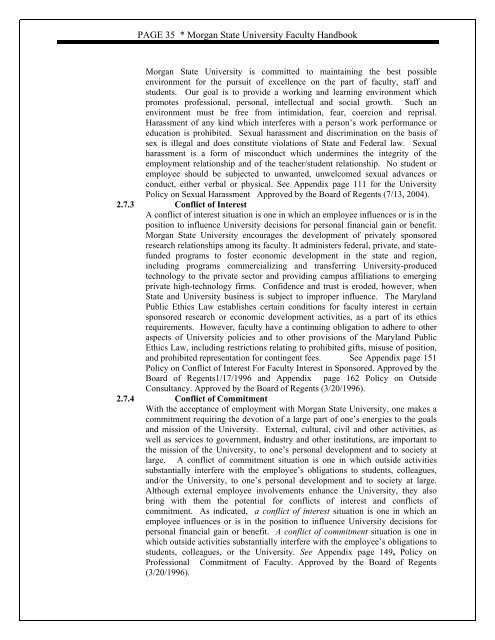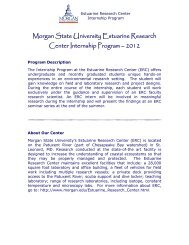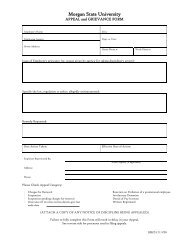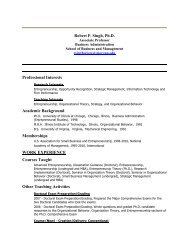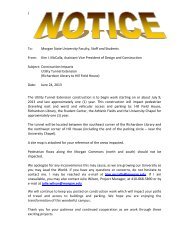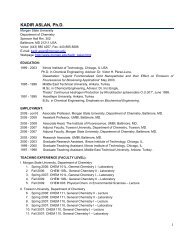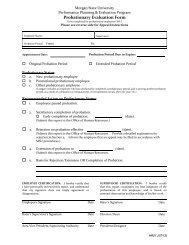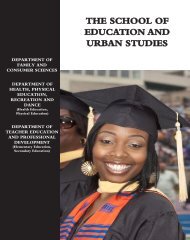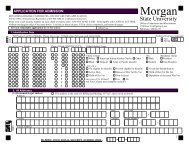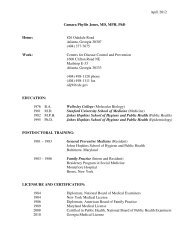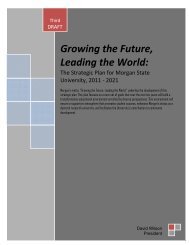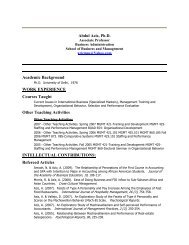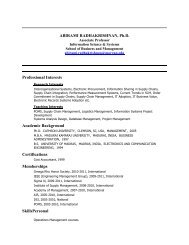FACULTY HANDBOOK July 2009 - Morgan State University
FACULTY HANDBOOK July 2009 - Morgan State University
FACULTY HANDBOOK July 2009 - Morgan State University
You also want an ePaper? Increase the reach of your titles
YUMPU automatically turns print PDFs into web optimized ePapers that Google loves.
PAGE 35 * <strong>Morgan</strong> <strong>State</strong> <strong>University</strong> Faculty Handbook<strong>Morgan</strong> <strong>State</strong> <strong>University</strong> is committed to maintaining the best possibleenvironment for the pursuit of excellence on the part of faculty, staff andstudents. Our goal is to provide a working and learning environment whichpromotes professional, personal, intellectual and social growth. Such anenvironment must be free from intimidation, fear, coercion and reprisal.Harassment of any kind which interferes with a person’s work performance oreducation is prohibited. Sexual harassment and discrimination on the basis ofsex is illegal and does constitute violations of <strong>State</strong> and Federal law. Sexualharassment is a form of misconduct which undermines the integrity of theemployment relationship and of the teacher/student relationship. No student oremployee should be subjected to unwanted, unwelcomed sexual advances orconduct, either verbal or physical. See Appendix page 111 for the <strong>University</strong>Policy on Sexual Harassment Approved by the Board of Regents (7/13, 2004).2.7.3 Conflict of InterestA conflict of interest situation is one in which an employee influences or is in theposition to influence <strong>University</strong> decisions for personal financial gain or benefit.<strong>Morgan</strong> <strong>State</strong> <strong>University</strong> encourages the development of privately sponsoredresearch relationships among its faculty. It administers federal, private, and statefundedprograms to foster economic development in the state and region,including programs commercializing and transferring <strong>University</strong>-producedtechnology to the private sector and providing campus affiliations to emergingprivate high-technology firms. Confidence and trust is eroded, however, when<strong>State</strong> and <strong>University</strong> business is subject to improper influence. The MarylandPublic Ethics Law establishes certain conditions for faculty interest in certainsponsored research or economic development activities, as a part of its ethicsrequirements. However, faculty have a continuing obligation to adhere to otheraspects of <strong>University</strong> policies and to other provisions of the Maryland PublicEthics Law, including restrictions relating to prohibited gifts, misuse of position,and prohibited representation for contingent fees. See Appendix page 151Policy on Conflict of Interest For Faculty Interest in Sponsored. Approved by theBoard of Regents1/17/1996 and Appendix page 162 Policy on OutsideConsultancy. Approved by the Board of Regents (3/20/1996).2.7.4 Conflict of CommitmentWith the acceptance of employment with <strong>Morgan</strong> <strong>State</strong> <strong>University</strong>, one makes acommitment requiring the devotion of a large part of one’s energies to the goalsand mission of the <strong>University</strong>. External, cultural, civil and other activities, aswell as services to government, industry and other institutions, are important tothe mission of the <strong>University</strong>, to one’s personal development and to society atlarge. A conflict of commitment situation is one in which outside activitiessubstantially interfere with the employee’s obligations to students, colleagues,and/or the <strong>University</strong>, to one’s personal development and to society at large.Although external employee involvements enhance the <strong>University</strong>, they alsobring with them the potential for conflicts of interest and conflicts ofcommitment. As indicated, a conflict of interest situation is one in which anemployee influences or is in the position to influence <strong>University</strong> decisions forpersonal financial gain or benefit. A conflict of commitment situation is one inwhich outside activities substantially interfere with the employee’s obligations tostudents, colleagues, or the <strong>University</strong>. See Appendix page 149, Policy onProfessional Commitment of Faculty. Approved by the Board of Regents(3/20/1996).


